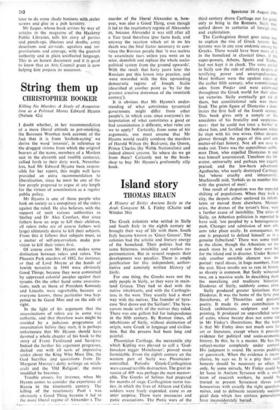String them up
CHRISTOPIIER BOOKER
Killing No Murder: A Study of Assassina- tion as a Political Means Edward Hyams (Nelson 42s)
1 doubt whether, in her recommendation of a more liberal attitude to pot-smoking, the Baroness Wootton took account of the fact that it is from 'hashish-eating' we derive the word 'assassin', in reference to the drugged visions from which the original bearers of the name, members of a Moslem sect in the eleventh and twelfth centuries, sallied forth to their dirty work. Neverthe- less, had Mr Edward Hyams been respon- sible for her report, this might well have provided an extra recommendation to liberalisation, since he must be one of the few people prepared to argue at any length for the virtues of assassination as a regular public policy.
Mr Hyams is one of those people who look on society as a conspiracy of the rulers against the ruled. He also believes, with the support of such various authorities as Shelley and Dr Alex Comfort, that since fathers have an urge to kill their children, all rulers (who are of course fathers writ large) ultimately desire to kill their subjects. From this it follows that subjects must, as a matter of self-preservation. make pro- vision to kill their rulers first.
Of course even Mr Hyams makes some distinction between rulers and rulers. The Phoenix Park murders of 1882, for instance, or that of Lord Moyne at the hands of Jewish terrorists in 1944 were obviously Good Things, because they were committed by oppressed colonial peoples against their tyrants. On the other hand some assassina- tions, such as those of President Kennedy and Lincoln, were regrettable, because as everyone knows, those particular two hap- pened to be Good Men and on the side of right.
In the light of his argument that the assassinations of rulers are in some way cathartic, and that therefore .wars might be avoided by a judicious programme of assassination before they start, it is perhaps unfortunate that Mr Hyams should have devoted a whole chapter of his book to the story of Franz Ferdinand ,and Sarajevo. Indeed the further his argument progresses, decked out with all sorts of impressive asides about the King Who Must Die, the God Sacrifice and quotations from Dr Margaret Murray's dotty writings on witch- craft and the 'Old Religion', the more muddled he becomes.
Trouble ensues, for instance, when Mr Hyams comes to consider the experience of Russia in the nineteenth century. The killing of the reactionary Paul i was obviously a Good Thing because it led to the more liberal regime of Alexander t. The murder of the liberal Alexander it, how- ever, was also a Good Thing, even though it led to the reactionary regime of Alexander in, because Alexander it was still after all a Tsar (and therefore ipso facto bad), and anyway the reaction which set in on his death was the final factor necessary to con- vince the Russian people that 'it was useless to assassinate tsars unless you went on to seize, demolish and replace the whole socio- political system from the ground upwards'. With the result that forty years later the Russians put this lesson into practice, and were rewarded with the fine upstanding democratic regime of Joseph Stalin (described at another point as `by far the greatest creative statesman of the twentieth century').
It is obvious that Mr Hyams's under- standing of what constitutes tyrannical government might differ from other people's, in which case, since everyone's in- terpretation of what constitutes a good or bad assassination is different, what rules are we to apply? Certainly, from some of his arguments, one must assume that Mr Hyams would readily condone the murders of Harold Wilson (by Biafrans), the Queen, Prince Charles (by Welsh Nationalists) and indeed almost anyone. So where do we go from there? Certainly not to the book- shop to buy Mr Hyams's profoundly silly book.


































 Previous page
Previous page